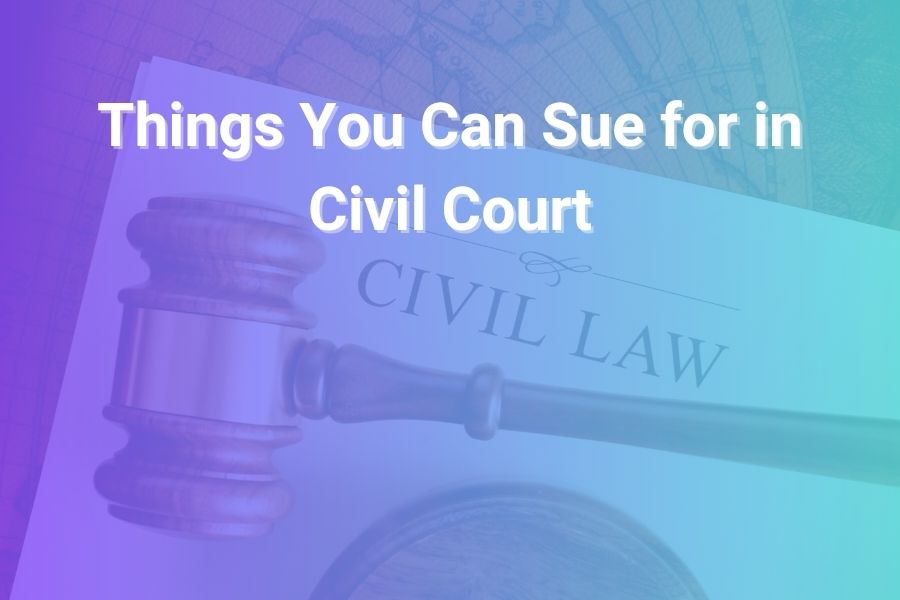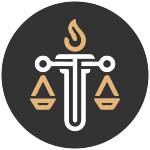
Civil court gives people a way to seek justice when someone’s actions cause harm, loss, or unfair treatment that doesn’t rise to a criminal level. Instead of jail time, civil lawsuits focus on compensation and restoring what was lost. From personal injury to breach of contract, thousands of cases pass through U.S. civil courts every day.
Understanding what you can sue for helps you protect your rights and know when to take legal action. In this article, you’ll learn the major types of civil claims, examples of common lawsuits, what damages you can recover, and how the civil court process works in the United States.
What Is a Civil Lawsuit?
A civil lawsuit happens when one party, known as the plaintiff, sues another person or organization, called the defendant, for causing harm or loss. Civil cases are different from criminal cases because they don’t involve the government prosecuting a crime. Instead, they deal with private disputes between individuals, businesses, or organizations. The goal is compensation, not punishment.
Civil lawsuits cover a wide range of situations—car accidents, unpaid debts, defamation, broken contracts, and property damage, to name a few. Each case starts when the plaintiff files a complaint in court outlining how the defendant’s actions caused harm and what damages they seek. The defendant then has the right to respond, and both sides present evidence before a judge or jury decides the outcome.
Common Reasons You Can Sue in Civil Court
People file lawsuits for many reasons, but most fall into a few major categories. Understanding these helps identify whether you have grounds for a claim.
1. Personal Injury
Personal injury is one of the most common civil lawsuits. If someone’s careless or intentional actions cause physical or emotional harm, you may sue for damages. This includes car accidents, slip-and-fall incidents, medical malpractice, workplace injuries, and product liability.
For example, if a driver runs a red light and hits your car, you can sue for your medical bills, property damage, and lost wages. In 2024, personal injury claims made up about 55% of all civil filings in state courts across the U.S.
2. Breach of Contract
Contracts are legally binding agreements. When one party fails to honor their obligations—like not paying for services, not delivering goods, or violating terms—you can sue for breach of contract.
For instance, if a contractor fails to complete a remodeling job after taking payment, the homeowner may sue for financial loss. The plaintiff must prove a valid contract existed, the other party breached it, and damages resulted from that breach.
3. Property Damage
If your property gets damaged because of another person’s negligence or intentional act, you can sue in civil court. Common cases involve car accidents, vandalism, or construction damage. Homeowners often take legal action when neighbors or contractors cause harm to their property.
Property damage claims seek to recover repair costs or the replacement value of the property. Courts may also award compensation for loss of use, such as temporary housing if your home becomes uninhabitable.
4. Defamation (Libel and Slander)
Defamation occurs when someone spreads false information that harms your reputation. Written defamation is called libel, while spoken defamation is slander. These lawsuits have become more common in the age of social media, where false statements can spread quickly.
To win, you must prove the statement was false, published or communicated to others, and caused measurable harm such as job loss, emotional distress, or financial loss. Public figures face a higher burden—they must also prove actual malice, meaning the statement was made with reckless disregard for the truth.
5. Fraud and Misrepresentation
When someone lies to gain money or an advantage and you suffer losses, you can file a civil lawsuit for fraud. Examples include investment scams, false advertising, or real estate misrepresentation.
A successful fraud claim must show that the defendant knowingly made a false statement, you relied on it, and it caused you harm. These cases can result in compensatory and sometimes punitive damages if the deception was severe.
6. Employment Disputes
Employees can sue employers for wrongful termination, discrimination, unpaid wages, or harassment. Federal and state laws protect workers from unfair treatment.
For example, if you are fired for reporting illegal activity at your workplace, you may have grounds for a retaliation claim. According to 2024 EEOC data, over 72,000 employment discrimination complaints were filed nationwide, showing how common workplace-related civil actions are.
7. Family and Domestic Issues
Civil court also handles family-related disputes such as divorce, child custody, and domestic partnerships. While these cases aren’t about money damages, they involve rights, responsibilities, and property division.
If one parent violates a custody order or refuses to pay child support, the other can take the issue back to court. Civil remedies ensure compliance and protect the welfare of children and families.
8. Landlord-Tenant Disputes
Renters and landlords often face conflicts over lease agreements, property conditions, or security deposits. Tenants can sue landlords for failing to make repairs, violating privacy rights, or keeping deposits unfairly.
Landlords, in turn, can sue tenants for unpaid rent or property damage. Most states have small claims court options for these cases, making it easier to resolve without hiring expensive attorneys.
9. Consumer Protection and Product Liability
If a defective or unsafe product injures you, you can sue the manufacturer, distributor, or retailer. Product liability cases include dangerous pharmaceuticals, faulty machinery, and defective auto parts.
Recent data shows that product-related lawsuits have grown by over 15% since 2023, especially in areas involving electronic devices and health supplements. Civil court allows consumers to hold companies accountable and push for safer products.
10. Medical Malpractice
Medical malpractice occurs when a healthcare provider’s negligence causes injury or worsens a patient’s condition. Examples include surgical errors, misdiagnosis, or medication mistakes.
These cases require expert testimony to prove that the medical professional failed to meet accepted standards of care. Malpractice lawsuits often involve significant damages due to the long-term impact on health and income.
11. Assault and Battery (Civil Version)
Even though assault and battery are criminal offenses, victims can also sue in civil court for damages. Civil assault focuses on the fear of harm, while battery involves actual physical contact.
If someone punches you or threatens violence, you can seek compensation for medical expenses, emotional distress, and lost income. Civil lawsuits don’t depend on criminal convictions, so even if the state doesn’t press charges, you can still pursue justice privately.
12. Wrongful Death
When a person dies because of another’s negligence or intentional act, surviving family members can file a wrongful death lawsuit. These cases cover loss of financial support, companionship, and funeral expenses.
Common examples include fatal car crashes, medical errors, or workplace accidents. The average wrongful death settlement in 2024 ranged between $500,000 and $1 million depending on circumstances and jurisdiction.
13. Privacy Violations
In a digital age, privacy has become a major legal issue. You can sue for invasion of privacy if someone misuses your personal data, records you without consent, or discloses private facts publicly.
Data breach lawsuits have surged as companies mishandle user information. In 2024 alone, over 3,000 major data breach suits were filed across the U.S. Civil law gives individuals a way to seek justice when personal information is exposed or exploited.
Types of Damages You Can Recover
When you win a civil case, the court may award different types of damages:
- Compensatory Damages: Cover actual financial losses such as medical bills, lost income, or property repairs.
- General Damages: Address non-financial harms like emotional distress or loss of enjoyment of life.
- Punitive Damages: Designed to punish severe misconduct and deter similar actions. These are common in fraud or intentional harm cases.
The amount depends on the evidence, severity of harm, and jurisdiction. Some states cap certain damages, especially in medical malpractice cases.
How the Civil Court Process Works
- Filing the Complaint: The plaintiff submits a written complaint explaining what happened and what compensation is sought.
- Serving the Defendant: The defendant receives official notice of the lawsuit.
- Response: The defendant can admit, deny, or counterclaim.
- Discovery: Both sides exchange documents, witness statements, and evidence.
- Settlement Negotiations: Most civil cases—over 90%—settle before trial.
- Trial: If no settlement occurs, the case proceeds to trial where a judge or jury decides.
- Judgment and Collection: If the plaintiff wins, the court issues a judgment. The plaintiff can then collect through garnishment or liens if payment isn’t made voluntarily.
Small Claims Court: A Simpler Option
For smaller disputes, many states offer small claims courts where individuals can sue without hiring a lawyer. Limits vary by state, usually between $5,000 and $25,000.
Common small claims include unpaid rent, minor property damage, or personal loans. The process is fast, informal, and affordable—perfect for resolving straightforward financial conflicts.
Why Civil Lawsuits Matter
Civil lawsuits uphold fairness in society. They allow people to hold others accountable without violence or revenge. They also push businesses and institutions to act responsibly. Whether you’re fighting for compensation after an accident or standing up to defamation, civil court gives you a platform to restore your dignity and recover what you lost.
While the process can seem intimidating, consulting an attorney helps you evaluate your options, gather evidence, and navigate the system effectively.
Conclusion
Knowing what you can sue for in civil court empowers you to protect your rights when someone wrongs you. From personal injuries to contract breaches, civil law offers structured ways to seek justice without criminal involvement.
As the number of civil filings continues to rise in 2025, understanding your options has never been more essential. If someone’s negligence or misconduct affects your life, the courtroom can become the path to recovery and accountability.
